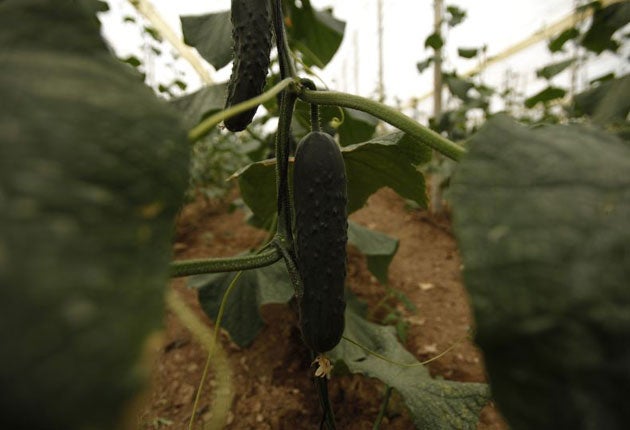Cucumbers blamed for 10 deaths in Germany 'not on sale in UK'

Your support helps us to tell the story
From reproductive rights to climate change to Big Tech, The Independent is on the ground when the story is developing. Whether it's investigating the financials of Elon Musk's pro-Trump PAC or producing our latest documentary, 'The A Word', which shines a light on the American women fighting for reproductive rights, we know how important it is to parse out the facts from the messaging.
At such a critical moment in US history, we need reporters on the ground. Your donation allows us to keep sending journalists to speak to both sides of the story.
The Independent is trusted by Americans across the entire political spectrum. And unlike many other quality news outlets, we choose not to lock Americans out of our reporting and analysis with paywalls. We believe quality journalism should be available to everyone, paid for by those who can afford it.
Your support makes all the difference.Checks have revealed British shelves are free of the cucumbers blamed for causing one of the worst outbreaks of E. coli in mainland Europe, health officials said last night. As the outbreak in Germany became the most serious in its history, killing 10 and infecting an estimated 1,000 people, the Food Standards Agency (FSA) said there was no evidence that British shops had stocked the vegetables suspected of spreading a virulent form of E. coli, hemolytic-uremic syndrome.
At the weekend, Germany repeated a warning to its citizens to avoid eating raw cucumbers, tomatoes and lettuce because of concerns they are carrying E. coli, which affects the blood, kidneys and, in extreme cases, the nervous system. Ilse Aigner, the Consumer Protection minister, said: "So long as the source of the contaminated vegetables cannot be identified beyond doubt, the warnings will stay in place."
But last night an FSA spokeswoman gave the UK a provisional all-clear. She said: "We have been in touch with all the biggest supermarkets through the British Retail Consortium and they have confirmed that they are not selling any of those cucumbers and there is no evidence of any of those cucumbers being sold in the UK."
So far there have been three suspected cases in England, all from Germans who have recently travelled back from the country. Germany normally has an average of 900 E. coli cases each year, but an estimated 1,000 patients have been infected so far and the outbreak is not thought to have peaked yet.
Although E. coli normally affected young children, the current outbreak has hit adults worst and women below the age of 40 in particular. Cases have been concentrated in the area around Hamburg. Hospitals in Hamburg, Kiel and Lübeck have been overloaded with patients suffering from the illness.
Health officials initially sourced the deadly bacteria to cucumbers imported from Spain and the European Commission said that two Spanish farms in Malaga and Almeria identified as having grown the vegetables had been shut down. However, confusion reigned when Spain denied that the farms had been closed and German officials found E. coli traces on cucumbers which they said could have been imported from elsewhere.
Cases have been reported in Denmark, the Netherlands and Sweden, all linked with travel to Germany. Austria's food safety agency removed organic cucumbers, tomatoes and aubergines supplied by a Spanish producer from 33 stores, including branches of a popular organic supermarket chain, Biomarkt.
In the UK, the Health Protection Agency said there had been no new reported cases over the weekend. It advised anyone returning to the UK from Germany with an illness, including bloody diarrhoea, to seek urgent medical attention and to make sure they mention any recent travel history.
Join our commenting forum
Join thought-provoking conversations, follow other Independent readers and see their replies
Comments